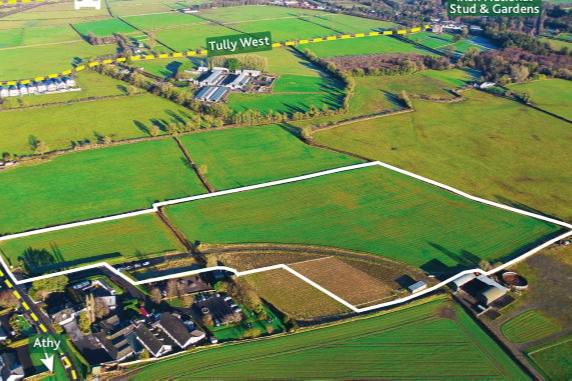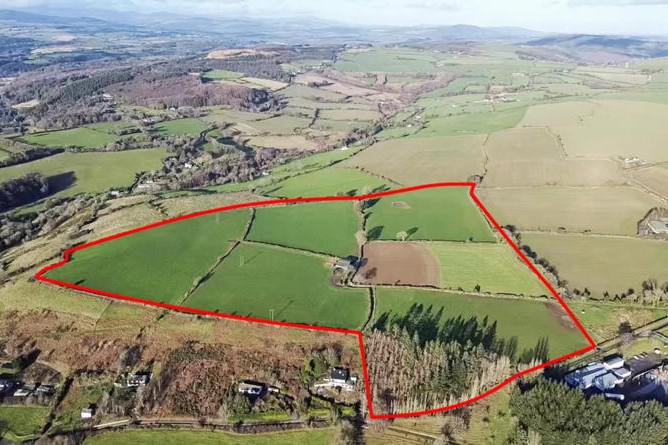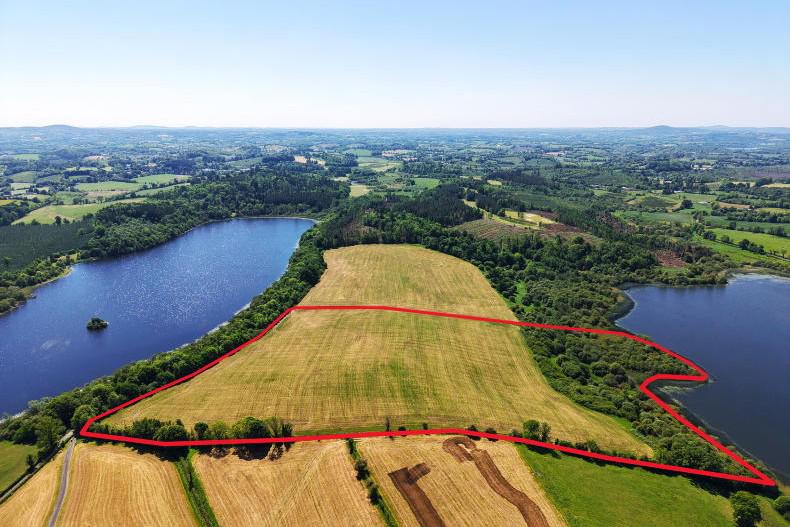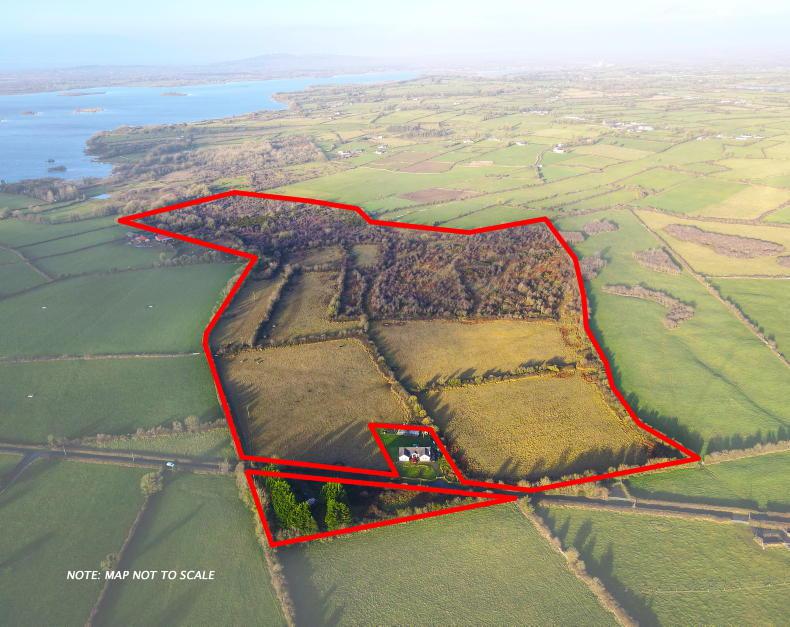A number of auctioneers are considering going online to replace scheduled auctions over the coming weeks, as a result of the COVID-19 emergency. Farmers are familiar with the concept of bidding by the tap of the cap or the flick of the finger. However, they may need to get used to bidding with the click of a mouse going forward. So how does it work?
Essentially, it is the same principal as the auction room – the highest bid is binding upon the bidder. However, there are some differences.
Online land auctions will often require a bidding deposit
Firstly, you will have to create an account on the selling agent’s website using your email address to register your interest.
Secondly, online land auctions will often require a bidding deposit. This will have to be transferred to the selling agent’s bank account prior to auction. The value of the bidding deposit will vary from auction to auction.
It is a good idea to organise this well in advance, because there can be a delay of a few days when transferring large amounts of money from one bank account to the other, especially if it is to a different bank. If you are not the successful bidder on the day, then the deposit is returned to you.
All corresponding legal documents can be accessed prior to the auction
Like an ordinary auction, it is up to you to review all the documentation relating to the land before the auction.
“All corresponding legal documents can be accessed prior to the auction,” Liam Farragher from IAM Sold Property Auctions (iamsold.ie) told Irish Country Living.
“These documents are uploaded to our website allowing any potential buyer the opportunity to review before the set auction date and time.”
The date and time of the auction will be the same principles as a public auction. The only difference is that rather than going to a hotel or auction room, you need to have internet access on your computer, laptop, tablet or mobile phone.
The auction will open for bidding at a certain time and will close a specific time later. There will be a count down timer displayed, indicating how long is left in the auction cycle. In some cases, you may not be made aware of the reserve price. If the bidding exceeds the reserve price within the allotted time, then the property will have been sold to the highest bidder.
When the auction opens, you will be able to place bids using the bid increase button provided
If it does not achieve that price, then it is not sold.
It is a case of “click to bid” with online auctions. When the auction opens, you will be able to place bids using the bid increase button provided. In some cases, this will be in line with the pre-determined bid increment levels. Every time you submit a bid, you will be shown whether your bid was successful. If someone else bids a higher amount, then you will be given a timeframe to choose whether or not you want to bid again. For example, you might have a minute.
The online auction will close as per the advertised “auction end time”. There may be an extension window if there are bids in the final minute of the auction, depending on the platform the selling agent uses.
For example, if a bid is placed in the “bidding extension window”, the clock will immediately reset to 60 seconds again and the auction will only finish when an entire 60-second “bidding extension window” passes without any further bids being placed.
If you do leave your bid until the final few seconds, you could risk your bid not being received by the platform server until after the closing time, and therefore not being accepted.
You are not restricted to placing a bid at the minimum bid amount, but can instead place a higher bid in one of two ways – by placing a maximum (proxy) bid or by placing an instant bid.
The Property Partners online bidding guide describes a maximum bid as follows; if the maximum bid is below the reserve price – the system will place an immediate bid at your maximum bid amount.
If the maximum bid is at or above the reserve price – the system will automatically increase your bid to be at the reserve, and will only bid again on your behalf if you are subsequently outbid by another bidder (up to your maximum bid amount).
Bidding example
1 The current bid on a lot is €90,000. The reserve price has been set at €100,000 (not disclosed).
2 Tom wants to bid. The minimum bid amount is €91,000 but Tom decides to place a maximum bid of €97,000. This is below the reserve price, so the system places a bid for Tom at his maximum bid amount and he becomes the highest bidder at €97,000.
3 Jane logs on to bid. The minimum bid amount is €98,000 but Jane places a maximum bid of €105,000. The system automatically increases Jane’s bid to meet the reserve and she is now the highest bidder at €100,000, however her maximum bid of €105,000 remains “in the system” and will be used to automatically outbid other bidders if required.
4 Tom is notified that he has been outbid. The minimum bid amount is now €101,000, but Tom decides to place an instant bid for €102,000.
5 The system uses Jane’s maximum bid to automatically outbid Tom, so the current bid is now €103,000 (with Jane).
6 If no further bids are placed Jane would win the lot for €103,000.
7 If however, Tom decided to place another bid for €105,000 (either as a maximum or instant bid), the bidding would jump to €105,000 and the bid would be with Jane, as she bid that amount first.
Five tips for online bidding
1 You or your solicitor should review all legal documents beforehand
No different to a regular land auction, you should review all the legal documentation in relation to the property beforehand and go view it.
2 Register your interest
Register your interest, as directed on the selling agent’s website and remember to organise your bidding deposit a few days in advance.
3 Check the date and time
Make sure you take note of when the auction is going to happen and that you have access to a computer, tablet or phone at that time.
4 Check your
internet connection
If your internet connection is unreliable, it is best to call the selling agent and ask them to bid on your behalf.
5 Familiarise yourself
with the online
bidding process
Make sure you know how to work the bidding platform and read the instructions given. If you need help contact the selling agent.
NB: This article is intended as a guide only and the online bidding process will vary depending on the platform the seller uses.
Read more
Land Price Report: don't get caught in an auction fix
Long read: the ABCs of buying and selling land
A number of auctioneers are considering going online to replace scheduled auctions over the coming weeks, as a result of the COVID-19 emergency. Farmers are familiar with the concept of bidding by the tap of the cap or the flick of the finger. However, they may need to get used to bidding with the click of a mouse going forward. So how does it work?
Essentially, it is the same principal as the auction room – the highest bid is binding upon the bidder. However, there are some differences.
Online land auctions will often require a bidding deposit
Firstly, you will have to create an account on the selling agent’s website using your email address to register your interest.
Secondly, online land auctions will often require a bidding deposit. This will have to be transferred to the selling agent’s bank account prior to auction. The value of the bidding deposit will vary from auction to auction.
It is a good idea to organise this well in advance, because there can be a delay of a few days when transferring large amounts of money from one bank account to the other, especially if it is to a different bank. If you are not the successful bidder on the day, then the deposit is returned to you.
All corresponding legal documents can be accessed prior to the auction
Like an ordinary auction, it is up to you to review all the documentation relating to the land before the auction.
“All corresponding legal documents can be accessed prior to the auction,” Liam Farragher from IAM Sold Property Auctions (iamsold.ie) told Irish Country Living.
“These documents are uploaded to our website allowing any potential buyer the opportunity to review before the set auction date and time.”
The date and time of the auction will be the same principles as a public auction. The only difference is that rather than going to a hotel or auction room, you need to have internet access on your computer, laptop, tablet or mobile phone.
The auction will open for bidding at a certain time and will close a specific time later. There will be a count down timer displayed, indicating how long is left in the auction cycle. In some cases, you may not be made aware of the reserve price. If the bidding exceeds the reserve price within the allotted time, then the property will have been sold to the highest bidder.
When the auction opens, you will be able to place bids using the bid increase button provided
If it does not achieve that price, then it is not sold.
It is a case of “click to bid” with online auctions. When the auction opens, you will be able to place bids using the bid increase button provided. In some cases, this will be in line with the pre-determined bid increment levels. Every time you submit a bid, you will be shown whether your bid was successful. If someone else bids a higher amount, then you will be given a timeframe to choose whether or not you want to bid again. For example, you might have a minute.
The online auction will close as per the advertised “auction end time”. There may be an extension window if there are bids in the final minute of the auction, depending on the platform the selling agent uses.
For example, if a bid is placed in the “bidding extension window”, the clock will immediately reset to 60 seconds again and the auction will only finish when an entire 60-second “bidding extension window” passes without any further bids being placed.
If you do leave your bid until the final few seconds, you could risk your bid not being received by the platform server until after the closing time, and therefore not being accepted.
You are not restricted to placing a bid at the minimum bid amount, but can instead place a higher bid in one of two ways – by placing a maximum (proxy) bid or by placing an instant bid.
The Property Partners online bidding guide describes a maximum bid as follows; if the maximum bid is below the reserve price – the system will place an immediate bid at your maximum bid amount.
If the maximum bid is at or above the reserve price – the system will automatically increase your bid to be at the reserve, and will only bid again on your behalf if you are subsequently outbid by another bidder (up to your maximum bid amount).
Bidding example
1 The current bid on a lot is €90,000. The reserve price has been set at €100,000 (not disclosed).
2 Tom wants to bid. The minimum bid amount is €91,000 but Tom decides to place a maximum bid of €97,000. This is below the reserve price, so the system places a bid for Tom at his maximum bid amount and he becomes the highest bidder at €97,000.
3 Jane logs on to bid. The minimum bid amount is €98,000 but Jane places a maximum bid of €105,000. The system automatically increases Jane’s bid to meet the reserve and she is now the highest bidder at €100,000, however her maximum bid of €105,000 remains “in the system” and will be used to automatically outbid other bidders if required.
4 Tom is notified that he has been outbid. The minimum bid amount is now €101,000, but Tom decides to place an instant bid for €102,000.
5 The system uses Jane’s maximum bid to automatically outbid Tom, so the current bid is now €103,000 (with Jane).
6 If no further bids are placed Jane would win the lot for €103,000.
7 If however, Tom decided to place another bid for €105,000 (either as a maximum or instant bid), the bidding would jump to €105,000 and the bid would be with Jane, as she bid that amount first.
Five tips for online bidding
1 You or your solicitor should review all legal documents beforehand
No different to a regular land auction, you should review all the legal documentation in relation to the property beforehand and go view it.
2 Register your interest
Register your interest, as directed on the selling agent’s website and remember to organise your bidding deposit a few days in advance.
3 Check the date and time
Make sure you take note of when the auction is going to happen and that you have access to a computer, tablet or phone at that time.
4 Check your
internet connection
If your internet connection is unreliable, it is best to call the selling agent and ask them to bid on your behalf.
5 Familiarise yourself
with the online
bidding process
Make sure you know how to work the bidding platform and read the instructions given. If you need help contact the selling agent.
NB: This article is intended as a guide only and the online bidding process will vary depending on the platform the seller uses.
Read more
Land Price Report: don't get caught in an auction fix
Long read: the ABCs of buying and selling land









SHARING OPTIONS